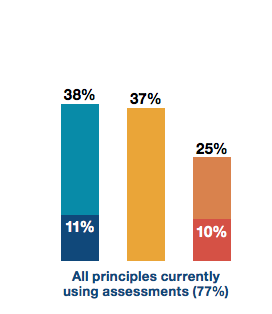Below are high level takeaways from a new Collaborative for Academic, Social, and Emotional Learning (CASEL) report prepared by Civic Enterprises with Hart Research Associates entitled Ready to Lead: A National Principal Survey on How Social and Emotional Learning Can Prepare Children and Transform Schools. The report is based upon a comprehensive survey of 884 pre-K to 12 school principals across the US.
The findings of this report can be broken into two general categories: What do principals already know and do, and what do they need to be more effective?
What do Principals Already Know and Do?
→ They know the value of teaching SEL to all students.
From the report: “Eighty -three percent of principals consider it to be very important for schools to promote development of SEL skills, and 98% think it probably or definitely true that SEL should be taught to all students.” Principals see many positive outcomes from strengthening students SEL skills. See the table below.
→ They seek and benefit from the support of their district office, and they engage their
constituencies.
Schools meeting SEL programmatic quality benchmarks report two important components: strong support from their district office and wide involvement of all stakeholders. Perhaps not surprisingly, principals in districts which place a great deal of emphasis on SEL are more than twice as likely to report they are implementing SEL systematically, as compared to districts where principals report little such emphasis. And principals in high performing SEL schools are nearly three times as likely to have high expectations of teacher and parent participation, when compared to low performing SEL schools.
All that being said, the truth is there is only a relatively small proportion of schools that are effectively fulfilling the widely-desired objective of strong SEL programming. Just over a quarter of middle/junior high and high school principals report having both developed and begun implementing a plan for SEL in their schools. When considering the benchmarks CASEL has established for SEL program implementation, the report says, “Of all principals surveyed, just one-quarter could be considered “high-implementers” of SEL.”
What do Principals Need to be More Effective?
→ A better measure and assessment of SEL skills.
Nearly 3 out of 4 of principals believe it is possible to accurately and fairly measure and assess SEL, and nearly 3 out of 5 “believe social and emotional skills should be part of how students are assessed annually.” They also have many ideas for how they would want to use these assessments. “An overwhelming majority of principals said they would use SEL assessments to identify students needing intervention (86%) or evaluate the effectiveness of SEL skills programs (79%). More than 70% said they could share the data with parents (73%) or use the assessments to improve teacher instruction (72%).”
But these beliefs about the power of SEL assessment are not being acted upon, and one reason is a lack of awareness of the tools that are available.
Only 17% of principals surveyed are familiar with SEL measurements, and even “most superintendents said they are not really doing much to collect data on SEL skills in any formalized way, and describe themselves as unfamiliar with the existing measures for doing so.” Among those principals who are using SEL assessments, less than half are satisfied with the systems they are using; “one in four see little to no usefulness in their current assessment measures.”
→ To provide greater support and training to teachers in SEL instruction and data usage.
Another area of great demand is in training for teachers, both in how to implement SEL in their classrooms, and in how to use SEL assessment data in their instruction.
More than half of principals see lack of teacher training as a big obstacle; less than half believe “the teachers in their building are very or fairly well prepared to teach social and emotional skills…. only 10% who believe their teachers are very prepared.” And “three out of five (61%) believe teachers in their school have little to no knowledge of how to use SEL assessment data to improve their instruction.”
What Principals know—that effective SEL programming and assessment greatly benefits their students—and what they need—better assessments and more training for teachers— is clear from this report.
ACT® is expanding the resources for SEL assessment and instruction that principals are seeking.
For principals and superintendents considering launching new SEL programs, or strengthening existing programs, ACT is also pleased to present a brand new high level overview for planning your initiative. “Eight Steps to Strengthening SEL in your School or District” will walk you through an eight step sequence of building better programming for your student skill development in this key area. Additional resources provided by ACT:
- A state of the art innovative assessment system, ACT Tessera™, for accurately measuring key SEL skills in students.
- Lesson plans and activities for teaching key SEL skills are part of the ACT Tessera Teacher Playbook.
- SEL consulting is available from ACT.ACT experts will meet with your school or district educators to advise a SEL program development, train teachers in the ACT Tessera Playbook instruction, and recommend general SEL best practices. To start the conversation email ACTConsultingServices@act.org.









